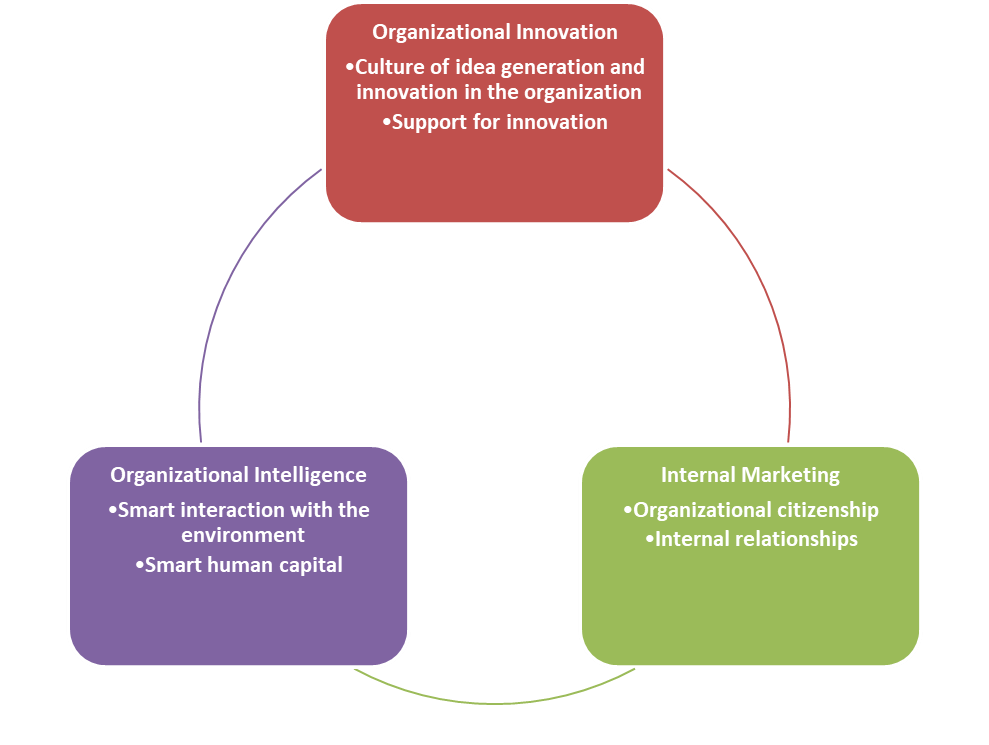A Qualitative Model of the Indicators and Components of Internal Marketing, Organizational Intelligence, and Organizational Innovation in the Tax Administration of Iran
Keywords:
Internal marketing, organizational intelligence, organizational innovation, Thematic AnalysisAbstract
Today, marketing has become a fundamental and essential element for the success of both profit and non-profit organizations. Given the continuously changing environment and the increasing number of uncontrollable external factors and threats in the market, mere gradual improvement is no longer sufficient. All organizations and companies need to move toward creativity and innovation to ensure their survival and active presence in the market. On the other hand, the aim of organizational intelligence is to accelerate the decoding and transfer of organizational knowledge, identify opportunities, and solve business problems more quickly than in the past. This study aims to propose a qualitative model of the indicators and components of internal marketing, organizational intelligence, and organizational innovation in the Tax Administration of Iran. The research is applied in purpose and uses a thematic analysis method. The sampling method was snowball sampling, and the main data collection method was conducting in-depth interviews with 15 experts, managers, and specialists in the fields of marketing and tax administration until theoretical saturation was reached. The thematic analysis process, following the approach provided by Braun and Clarke (2006), was conducted in six stages. Initially, 213 primary codes were obtained, and after removing duplicate codes, 35 selective codes were extracted. By aggregating the selective codes into broader semantic domains, six main and sub-themes were identified and named. The data were analyzed using MAXQDA software, both separately and in general. In the findings, two sub-themes and 13 basic themes were identified for internal marketing, two sub-themes and 10 basic themes for organizational innovation, and two sub-themes and 11 basic themes for organizational intelligence.
References
J. S. Gonçalves, M. S. Neves, B. B. Sousa, and J. Ferreira, "The Importance of Internal Marketing in Companies and Its Relation With Happiness at Work," in Resilience of Multicultural and Multigenerational Leadership and Workplace Experience: IGI Global, 2024, pp. 162-181.
A. Nasr Esfahani, Z. Amiri, and M. Farrokhi, "The Impact of Internal Marketing on Organizational Innovation: The Mediating Role of Employee Self-Efficacy (Case Study: Emersun Company)," Scientific-Research Quarterly of Entrepreneurship Development, vol. 6, no. 3, pp. 27-45, 2013.
D. M. Brown et al., "Sustainability starts from within: A critical analysis of internal marketing in supporting sustainable value co-creation in B2B organisations," Industrial Marketing Management, vol. 117, pp. 14-27, 2024, doi: 10.1016/j.indmarman.2023.12.006.
F. Ahmadi, "Presenting a Local Model of Organizational Innovation (Case Study: Companies in Ilam Industrial Park)," Entrepreneurship and Innovation Research, vol. 3, no. 1, pp. 1-13, 2024.
I. S. Butienė, I. Valantinė, and E. Eimontas, "Relationship between organizational intelligence and innovations: case of Lithuanian sports federations," Baltic Journal of Sport and Health Sciences, vol. 1, no. 100, pp. 47-47, 2016, doi: 10.33607/bjshs.v1i100.47.
A. A. Bailey, F. Albassami, and S. Al-Meshal, "The roles of employee job satisfaction and organizational commitment in the internal marketing-employee bank identification relationship," International Journal of Bank Marketing, 2016, doi: 10.1108/IJBM-06-2015-0097.
A. Taheri Hoshi and S. M. Aroni Tabatabaei, "Examining the Impact of Organizational Intelligence, Intellectual Capital, and Organizational Innovation on Business Intelligence in Pasargad Insurance Company," Management and Industrial Engineering, vol. 5, no. 17, pp. 61-80, 2024.
M. Taheri and Z. Haji, "Examining the Impact of Internal Marketing and Organizational Learning on Employee Performance Improvement with the Mediating Role of Organizational Innovation (Case Study: Small and Medium Enterprises in Tehran)," Knowledge-Based Business Management, vol. 3, no. 27, pp. 63-89, 2023.
A. Mirzaei and H. Vafaei Basir, "Examining the Relationship Between Organizational Intelligence and Innovation in Knowledge-Based Companies (Case Study: Knowledge-Based Companies in Hamadan Province)," in Second International Conference on Challenges and New Approaches in Industrial Engineering, Management, and Accounting, Damghan, 2021.
H. Derisavi Bahmanshir, F. Omidi, F. Makoundi, and M. Basirat, "Developing Measures for the Internal Marketing Model (Case Study: Khuzestan Sugarcane Development Company and Subsidiaries)," Business Studies, vol. 19, no. 108, pp. 63-90, 2021.
R. K. Sarangal, M. Nargotra, R. Singh, and G. Singh, "Internal Marketing, Faculty Engagement, and Innovative Behavior: An Empirical Study in Higher Education," Jindal Journal of Business Research, pp. 22786821241237025-22786821241237025, 2024, doi: 10.1177/22786821241237025.
S. Azizi and M. Naeli, "Internal Marketing Mix Operationalization: A Review of the Literature," in Internal Marketing: Issues and Perspectives for Internal Customer-Centric Management: Internal Marketing, 2024, pp. 155-185.
A. Aggarwal, H. K. Baker, and N. A. Joshi, "Organizational innovation as business strategy: A review and Bibliometric analysis," Journal of the Knowledge Economy, vol. 1, pp. 1-27, 2024, doi: 10.1007/s13132-024-01830-2.
M. Nguyen, P. Sharma, and A. Malik, "Leadership styles and employee creativity: the interactive impact of online knowledge sharing and organizational innovation," Journal of Knowledge Management, vol. 28, no. 3, pp. 631-650, 2024, doi: 10.1108/JKM-01-2023-0014.
A. M. Nasef, M. A. Mohamed, E. M. Abdelaal, and M. G. Abouraia, "The Effect of Internal Marketing on Innovation in Hotels," Journal of Tourism, Hotels and Heritage, vol. 4, no. 1, pp. 37-54, 2022, doi: 10.21608/sis.2022.127022.1042.
C. T. Pavlidou and A. Efstathiades, "The effects of internal marketing strategies on the organizational culture of secondary public schools," Evaluation and Program Planning, vol. 84, no. 1, pp. 1-12, 2021, doi: 10.1016/j.evalprogplan.2020.101894.
I. Adhicandra, T. Tanwir, A. Asfahani, J. W. Sitopu, and F. Irawan, "Latest Innovations in Internet of Things (IoT): Digital Transformation Across Industries," Innovative: Journal Of Social Science Research, vol. 4, no. 3, pp. 1027-1037, 2024, doi: 10.31004/innovative.v4i3.10551.
A. Mosleh and A. Allahyari Bouzanjani, "Developing Innovative Products: The Effect of Internal Market Orientation and the Mediating Role of Organizational Intelligence," Innovation Management, vol. 3, no. 2, pp. 49-72, 2014.
V. Kolbjørnsrud, "Designing the Intelligent Organization: six principles for Human-AI collaboration," California Management Review, vol. 66, no. 2, pp. 44-64, 2024, doi: 10.1177/00081256231211020.












